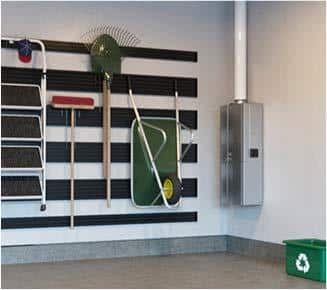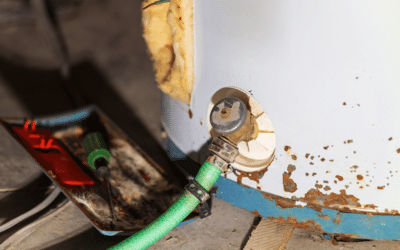Few things rival the comfort of a long, indulgent hot shower or bath, but nothing can be more frustrating than having that blissful moment cut short by a sudden rush of cold water. To tackle this common inconvenience and improve their overall hot water experience, many homeowners are switching to tankless water heaters from traditional tank-style water heaters.
Tankless water systems are becoming the preferred choice for a wide array of advantages. Our goal is to delve into the question: Is switching to a tankless water heater worth it? We’ll explore the numerous benefits and cost-effective aspects to help you determine if this transition is a valuable investment for your home.
Initial Cost vs. Long-Term Savings
One of the primary reasons why Hampton Roads homeowners consider switching to a tankless water heater is the long-term energy savings. A household water bill accounts for as much as 30% of a home’s energy bill, so cost-saving water heater options are vital.
One of the major cons of tankless water heaters is the upfront cost. Compared to electric and gas tank water heaters, tankless water heaters cost 2-3X that of their tank counterparts.
According to the Department of Energy, demand water heaters can be 24%–34% more energy efficient than conventional storage tank water heaters. Overtime, the energy savings you receive can offset your initial investment in a tankless water heater.
If you’re considering switching to a tankless water heater, you’re interested in the long-term savings and convenience of constant hot water, which can make the initial cost easier to swallow.
Financing Available
Not all installs and replacements can be paid out-of-pocket. To help Hampton Roads families get the BEST in HVAC, Generators, and Plumbing equipment, we offer financing options (subject to credit approval). We help keep your home updated & your budget manageable.
Energy Efficiency
Tankless water heaters are super energy-efficient compared to traditional tank-style heaters. Traditional water heaters keep a large tank of water hot all the time, which results in standby energy loss. Think of it like a pot of soup constantly simmering on the stove, even when you’re not hungry. Tankless heaters, on the other hand, heat water only when you need it, like turning on a burner when you’re ready to cook. This eliminates standby energy loss and can save you money on your energy bills.
Because tankless water heaters use less energy, they produce fewer greenhouse gas emissions and have a longer lifespan than traditional tanks. So, by switching to a tankless heater, you’re not only keeping more money in your pocket but also reducing energy waste and your environmental footprint.
Water Usage and Demand
Selecting the right tankless water heater involves a key consideration: choosing a unit with an appropriate flow rate.
Flow rate: how much hot water the heater can provide per minute.
It’s crucial to match this flow rate with your household’s hot water demands, particularly during peak usage times. To do this effectively, assess your hot water usage patterns. Consider factors such as the number of showers, baths, faucets, and appliances that may require hot water simultaneously.
By evaluating your specific needs, you can ensure that the tankless water heater you select can comfortably meet your household’s hot water demands. Matching the flow rate with your usage patterns is essential for a consistent and efficient hot water supply.
Space and Installation
Most water heaters are in garages, basements, or their own closets. By switching to a tankless water heater, homeowners can take back that space because tankless water heaters have a smaller square footage and are wall mounted.

Tankless Water Heater Installation Considerations
The cost of installing a tankless water heater can vary based on several factors:
- Existing Infrastructure: If your home’s plumbing and electrical systems are already compatible with a tankless unit, installation costs may be lower.
- Fuel Type: Installation costs can differ depending on whether you choose an electric, natural gas, or propane tankless heater. Gas units might require more extensive gas line work. Your existing energy source can significantly influence your decision. If you’re replacing a traditional water heater with the same fuel type, it can simplify installation and potentially reduce costs. However, switching to a different fuel type may involve additional adjustments and expenses in your plumbing and gas or electrical systems.
- Venting: Tankless water heaters typically need different venting than tank-style units. If venting modifications are necessary, it can affect installation costs.
- Location: The ease of access to the installation location and whether any modifications to the area are needed can impact costs.
The best way to determine the cost of switching to a tankless water heater is to get quotes from professional water heater installers, like Smith & Keene. A professional installer can assess your hot water needs, determine the appropriate tankless water heater size, evaluate existing infrastructure for required modifications, and explore financing options to make the switch more affordable.
Maintenance Requirements
Did you know that tank water heaters require flushing to keep them running efficiently? Sediment and minerals in water settle at the bottom of the tank, creating a layer that insulates the heating element. The more sediment, the more energy your water heater must use to heat up your water.
With a tankless water heater, you’ll still need to flush or descale your water heater, but it’s minimal. With a maintenance plan, like Smith & Keene’s Signature Service Plan, you can ensure your plumbing, HVAC, generators, and electrical systems are well maintained and extend their lifespan.
Is It Worth Switching to a Tankless Water Heater?
If your water heater is showing signs that it’s approaching the end of its lifespan or you’re seeking ways to enhance energy efficiency and reduce water bills, the switch to a tankless water heater presents numerous benefits. Although the initial cost of installation might give pause, it’s important to consider the substantial advantages that make transitioning to a tankless system a worthwhile investment.
For those already contemplating this transition, we wholeheartedly endorse the move, as it has the potential to yield energy savings, maximize space utilization, and provide a dependable supply of hot water tailored to your specific needs. To kickstart this process, we recommend reaching out to experienced professionals like Smith & Keene for estimates and personalized guidance, ensuring a seamless and cost-effective transition.
Rinnai Tankless Water Heater
Enjoy cost savings & hot water any time you need it! IT'S TIME to get a new Rinnai Natural Gas Tankless Hot Water Heater from Smith & Keene.
Limited time offer. Offer subject to change. Call for pricing and details.
Frequently Asked Questions
What do I need to know before switching to a tankless water heater?
Before making the switch, it’s crucial to assess your household’s hot water demands and select a tankless unit with an appropriate flow rate to ensure a consistent supply of hot water.
How much does it cost to convert to a tankless water heater?
The cost of conversion can vary based on factors like your existing infrastructure, choice of tankless unit, and installation requirements. Generally, it’s an investment upfront, but long-term energy savings can offset the initial expense.
How hard is it to switch to a tankless water heater?
The level of difficulty depends on your home’s existing setup and the chosen unit. While some adjustments may be necessary, professional installers can handle the conversion efficiently, ensuring a smooth transition to a tankless water heater with minimal disruption.







